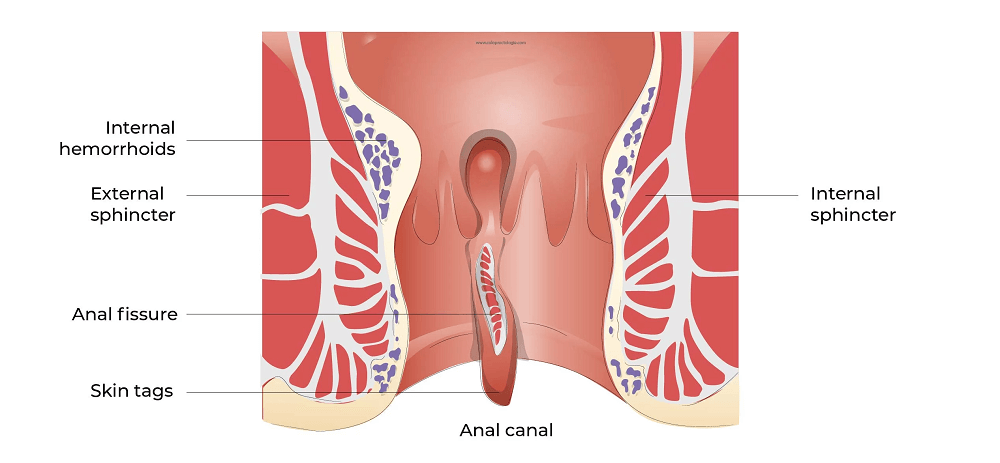Fissure
Understanding Fissures: A Comprehensive Guide to Symptoms, Causes, and Treatment
An anal fissure is a small tear or cut in the skin lining the anus, often causing discomfort, pain, and sometimes bleeding. Though many people experience them at some point in their lives, a fissure can become a persistent problem if left untreated. In this blog, we’ll take a deep dive into the causes, grades, symptoms, treatments, and why Surgiplus Hospital in Nagpur, led by Dr. Pitambar Masram, is the best choice for fissure treatment.

What is an Anal Fissure?
An anal fissure is a painful tear or crack in the skin around the anus. The tear typically occurs due to trauma caused by passing hard stools, constipation, or prolonged diarrhea. It may also result from excessive anal intercourse or other physical trauma to the area.
Fissures are most commonly seen in the posterior midline (the area at the back of the anus), but can also occur in the anterior midline (front). Anal fissures can cause intense pain, especially during and after bowel movements.
Grades of Fissure: Understanding the Severity
Anal fissures are classified into different grades based on their severity and the healing process. These grades help doctors determine the appropriate treatment.
- Grade 1: A superficial tear in the skin, typically without muscle involvement. This grade often heals with conservative treatments like dietary changes and topical creams.
- Grade 2: A deeper tear that might extend into the underlying muscle (anal sphincter) but still doesn’t cause chronic symptoms. Medical intervention is often required.
- Grade 3: A chronic fissure that has failed to heal and may have caused scarring or skin tags. Surgical intervention is usually recommended for this grade.
- Grade 4: This is the most severe form of fissure, often accompanied by anal stenosis or fibrosis. It can be persistent, requiring surgery for permanent relief.
Why Anal Tags Develop with Fissures
Anal tags are small lumps or skin flaps that can develop around the anus as a result of a chronic fissure. They form as part of the body’s healing process when the skin around the tear thickens or scars. These skin tags can be a result of the persistent irritation caused by the fissure or as a result of a chronic or healing fissure. Though anal tags are generally not painful, they can cause discomfort, hygiene issues, or cosmetic concerns, which is why they may be removed during treatment.
Difference Between External Piles and Anal Tags
It’s important to differentiate between external piles (hemorrhoids) and anal tags, as both can occur around the anus but are different in nature.
- External Piles (Hemorrhoids): These are swollen veins that occur in the lower rectum and anus. They can be internal or external. External hemorrhoids can cause itching, bleeding, and pain, especially during bowel movements. They can also protrude from the anus.
- Anal Tags: These are pieces of excess skin that remain after an anal fissure has healed. Unlike hemorrhoids, they don’t involve swelling of veins, but they may occur due to the body’s healing response to fissures.
What Are the Symptoms of an Anal Fissure?
The main symptoms of an anal fissure include:
- Pain during and after bowel movements. The pain can last for hours and is often described as sharp, burning, or tearing.
- Bleeding, usually bright red, on the toilet paper or in the stool.
- Itching or irritation around the anus.
- A visible crack in the skin around the anus.
- Spasms of the anal sphincter (muscle around the anus) after a bowel movement, which can worsen the pain.
If any of these symptoms persist, it’s crucial to seek medical advice to avoid chronic complications.
Treatment Modalities for Fissure in Ano
Treatment for an anal fissure typically depends on its severity and duration. Here are some common treatment options:
Conservative Treatments
- Dietary Modifications: Eating a high-fiber diet and drinking plenty of water to avoid constipation and promote softer stools.
- Topical Medications: Creams or ointments containing nitroglycerin, calcium channel blockers, or steroids to help relax the anal sphincter, reduce pain, and speed up healing.
- Warm Sitz Baths: Sitting in warm water can relax the anal muscles and reduce pain.
Non-Surgical Medical Treatments
- Botox Injections: Botulinum toxin injections can help relax the anal sphincter and promote healing by reducing muscle spasms.
- Stool Softeners: These can make bowel movements easier and less painful, preventing further irritation to the fissure.
Surgical Treatment
- Lateral Internal Sphincterotomy: This procedure involves cutting a small portion of the anal sphincter muscle to relieve spasm and help the fissure heal. It’s often recommended for chronic fissures.
- Fissurectomy: This involves removing the fissure and surrounding scar tissue to facilitate healing.
Why Surgiplus Hospital, Nagpur, is the Best Option
When it comes to treating anal fissures, Surgiplus Hospital in Nagpur is one of the top healthcare institutions that offers comprehensive and advanced treatment options. Here’s why:
- State-of-the-art Facilities: Surgiplus Hospital is equipped with the latest medical technology for accurate diagnosis and treatment.
- Comprehensive Care: They offer both conservative and advanced surgical treatments tailored to individual needs.
- Experienced Medical Staff: The hospital has a highly qualified team of surgeons and medical professionals specializing in colorectal disorders, ensuring the best care for patients.
Why Dr. Pitambar Masram is the Best Colorectal Surgeon in Nagpur
Dr. Pitambar Masram is one of the most respected and experienced colorectal surgeons in Nagpur, with over 21 years of experience in treating various anorectal conditions, including anal fissures. Here’s why Dr. Masram stands out:
- Specialization: He has a Fellowship in Coloproctology, which means he has received advanced, specialized training in managing complex colorectal conditions, including anal fissures, hemorrhoids, and other disorders.
- Expertise: With over two decades of clinical experience, Dr. Masram has successfully treated thousands of patients, including those with chronic anal fissures.
- Personalized Approach: Dr. Masram focuses on understanding each patient’s unique condition and provides treatment options suited to their specific needs, from conservative care to surgical interventions.
- Patient-Centered Care: His compassionate approach ensures that patients are well-informed and comfortable during their treatment process.
Dr. Pitambar Masram’s unmatched expertise, combined with Surgiplus Hospital’s cutting-edge facilities, makes them the best choice for anyone dealing with fissures or other colorectal issues.
Conclusion
Anal fissures can be highly uncomfortable, but with the right treatment and expert care, they are treatable. Whether you need conservative treatment or advanced surgical intervention, Surgiplus Hospital in Nagpur, led by Dr. Pitambar Masram, is your best choice. With his extensive experience and dedication to patient care, you can trust that you’re in safe hands for resolving your anal fissure concerns.
If you’re suffering from an anal fissure or have questions about treatment options, don’t hesitate to contact Surgiplus Hospital today. Get in touch with Dr. Pitambar Masram, and take the first step toward a healthier, pain-free life!
